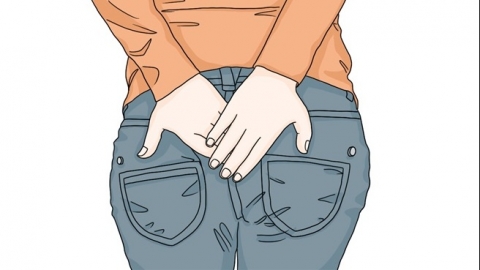How can anal skin tags be removed?
Generally, anal skin tags may be caused by long-term constipation, prolonged sitting or standing, external hemorrhoid swelling, prolapsed internal hemorrhoids, rectal prolapse, and other factors. It is recommended to seek timely medical consultation, identify the underlying cause, and then improve the condition under a doctor's guidance through general treatments, medication, surgical interventions, and other methods. A detailed analysis is as follows:

1. Long-term constipation: Excessive straining during bowel movements increases abdominal pressure, causing the perianal venous plexus to dilate and form skin tags, often accompanied by difficult bowel movements. Adjust your diet by consuming more fiber-rich foods such as spinach and kiwifruit. Drink more than 1500 ml of water daily, develop regular bowel habits, and avoid excessive straining during defecation.
2. Prolonged sitting or standing: Remaining in the same posture for extended periods can obstruct perianal venous return and cause blood stasis, leading to skin tags, which are often not significantly painful. Take a 5–10 minute break to move around every hour of sitting or standing. Choose a breathable cushion and perform a 10-minute sitz bath daily with water around 40°C to promote perianal blood circulation.
3. External hemorrhoid swelling: Consumption of spicy foods or alcohol can cause congestion and swelling of the external hemorrhoidal venous plexus, forming skin tags accompanied by pain. Follow your doctor's instructions to apply topical medications such as Compound Fucoidan Cream, Yunnan Baiyao Hemorrhoid Ointment, or Ma Yinglong Musk Hemorrhoid Cream. Avoid consuming spicy foods to reduce irritation to the perianal area.
4. Prolapsed internal hemorrhoids: When internal hemorrhoids progress to stages II–III, they prolapse out of the anus during bowel movements, forming skin tags. In early stages, they may retract spontaneously. Follow your doctor's instructions to use medications such as AnTai suppositories, Compound Fucoidan suppositories, or Puji Hemorrhoid suppositories. After defecation, clean the anal area and insert the suppository into the rectum. Gently push the prolapsed tissue back in and avoid prolonged squatting.
5. Rectal prolapse: The rectal mucosa or full rectal wall may prolapse from the anus, forming skin tags, often accompanied by a feeling of incomplete evacuation. Mild cases can improve with anal sphincter exercises, performed three times daily for 15 minutes each session. Severe cases require a circumferential mucosectomy performed by a physician, which involves removing excess mucosa and fixing the rectum to promote resolution of the skin tags.
In daily life, maintain perianal hygiene and use soft toilet paper for wiping. Avoid wearing tight pants to reduce perianal friction. Maintain a regular sleep-wake cycle and avoid staying up late. Comprehensive nursing care can help improve perianal health and promote resolution of skin tags.




